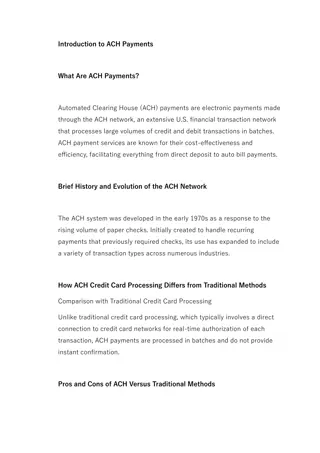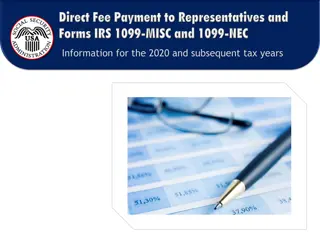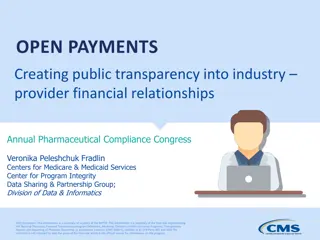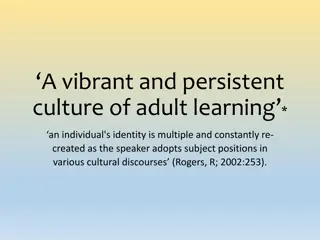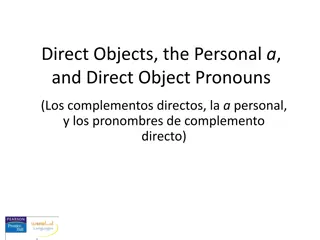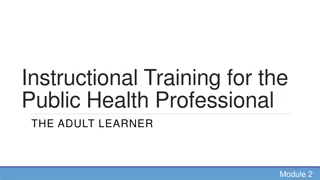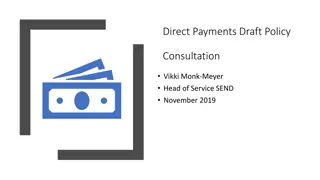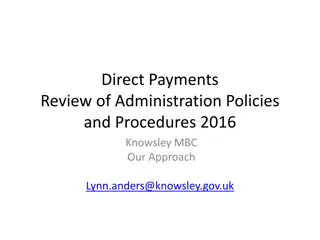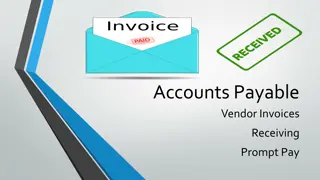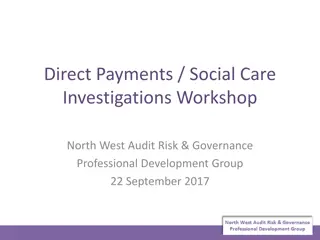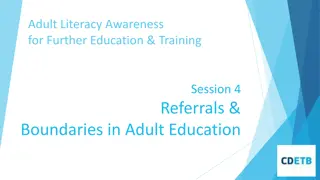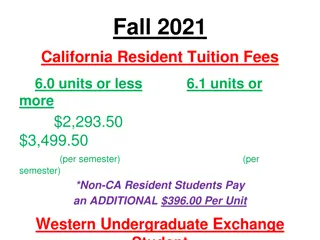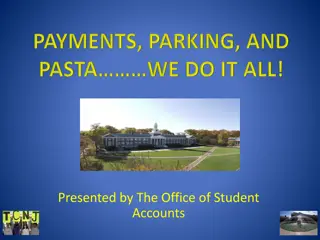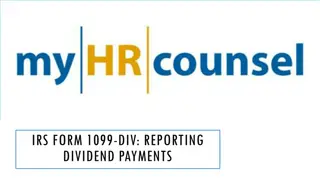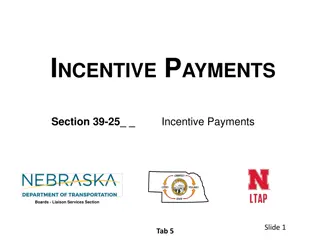Understanding Direct Payments in Adult Social Services
Direct payments offer individuals receiving support from social services the freedom to manage and purchase their care services, promoting independence and choice. The Care Act 2014 and Mental Capacity Act 2005 are key legislations supporting individuals with care needs. Direct payments empower individuals to customize their care plans, enhancing their well-being and autonomy through personalized support services.
Download Presentation

Please find below an Image/Link to download the presentation.
The content on the website is provided AS IS for your information and personal use only. It may not be sold, licensed, or shared on other websites without obtaining consent from the author. Download presentation by click this link. If you encounter any issues during the download, it is possible that the publisher has removed the file from their server.
E N D
Presentation Transcript
Direct Payments Adult Social Services (18 and over) Zara Belkacemi Consultant Social Worker
The Care Act 2014 Applies to all adults with and care and support needs and their carers. The Care Act emphasises prevention and delaying the need for support. Mental Capacity Act 2005 Protect and empower individuals. It protects vulnerable people over the age of 16 around decision-making. It says that every adult, whatever their disability, has the right to make their own decisions wherever possible. Adult Social Services The aim of Adult Social Care is to assist people to meet their care and support needs and to promote their independence and personal wellbeing strengths-based approach. Care Act Assessment Eligibility Criteria Unable to meet two or more outcomes.
A direct payment is a different way for people who receive support from social services to organise and purchase their care. Instead of the council arranging a person s care and support, the council will pay the person directly, known as a direct payment, so that the person can then use this money to arrange and purchase their own care and support. If you have been assessed by the council as having care and support needs and you are eligible for help from the council, a support plan will be completed with you, and you will be allocated a personal budget. A personal budget is the amount of money that is required to meet your eligible care needs. Once your personal budget has been calculated and authorised, you can then decide how you want to receive your personal budget. A Direct Payment is one of the options. You must be over 16 You can only get direct payments if you ve been assessed by social services as needing care and support services. What is a Direct Payment?
Direct payments remain the Governments preferred mechanism for personalised care and support. They provide independence, choice and control by enabling people to organise their own care and support in order to meet their eligible needs. Benefits of Direct Payment They encourage people to take ownership of their care planning, and provide people with more options over how their needs are met They can be used flexibly For example: You can employ a Personal Assistant with a Direct Payment to support you with your needs. This could be someone you know and trust. It could be someone who understands your culture or shares the same interests as you
How can Direct Payments be used? A Direct Payment can be used in a wide range of creative ways if it is safe and legal to do so and has been agreed as part of your support plan. The care and support plan completed with your social worker will outline how the direct payment can be used to meet the person s assessed care needs. You must only use your direct payment on what is stated within your support plan. Whilst you have choice, control and flexibility on how to use your Direct Payment, you must ensure it is used only to meet your care and support needs and it has been agreed with your social worker in your support plan. There are a range of support services you can purchase via your Direct Payment, such as: Personal care and assistance: You could employ a Personal Assistant of your choice or purchase carers from a care agency to help you with your day-to-day care needs. Short breaks and respite care: You could purchase respite care so that a friend or family member can sometimes get a break from providing unpaid support Access the community, social activities, leisure activities and transport: This could include a day centre, paying a care worker or Personal Assistant to help you get out and about in the community or paying for transport to specific activities. Short-term stay in a care home: You can use your Direct Payment to stay in a care home for a short period of time (it cannot be longer than four consecutive weeks in any 12-month period). A Direct Payment cannot be used to pay for a longer stay in a care home. Please speak to your social worker or contact Vibrance (Direct Payment Support Services) for more information on this. Paying for care if you are away from home or if your care worker is away: You could use your Direct Payment as a one-off to purchase care in another area if you are temporarily away from home. Similarly, you could also purchase replacement care if your care worker is away In exceptional circumstances, you may be able to purchase equipment to meet your assessed eligible care need. This will need to be agreed in advance with the council.
How can I receive a Direct Payment? A social worker will complete a care act/needs assessment with the individual to determine if they are eligible for support (Using the Eligibility Criteria under The Care Act 2014) If you are eligible for support from the council, then you will be allocated a personal budget. A personal budget is the amount that the council would spend on services to meet your eligible care and support needs. Once a personal budget has been agreed, the social worker will discuss with the person how they want to use their personal budget (support planning stage). Every support plan is individualistic and tailored towards the needs and wishes of that person. The person can request to receive their personal budget as a direct payment to arrange and purchase their care. Alternatively, they can choose a managed budget which is where the council will arrange the care for them Or they can have a combination of both direct payment and managed budget.
Employing a Personal Assistant If you decide you want to receive a Direct Payment and want to employ a Personal Assistant, your social worker will offer to make a referral to Vibrance (The Council's Direct Payment Support Service). This is because once you have recruited a Personal Assistant, you are legally responsible to follow the Employment Law (HMRC, Employers Liability Insurance, Contracts of Employment, Right to Work Checks, DBS checks, National Minimum Wage, Holiday/Sick Pay, Workplace pension etc). The Direct Payment Support Service, Vibrance, can give you all the information and advice you need to be a good employer and to support you throughout the process. Once the referral to Vibrance has been completed, the social worker will then proceed with setting up of the Direct Payment. If you decide to not use Vibrance s services, you must sign a waiver form. You also do not require Vibrance s involvement if you are not employing a Personal Assistant.
Ways of receiving a Direct Payment Pre-paid card option Pre-paid card option with Payroll Agency Separate Own Bank Account Monitoring by our Direct Payment Team will be routinely done, and you must always keep receipts and record of what you spend your Direct Payment on. You must sign and submit timesheets. Regularly submit monitoring information Keep records (bank statements, receipts, invoices, payslips etc.) Misuse of funds can lead to the termination of the Direct Payment. Make sure your financial contribution is paid into your DP account
Financial Assessment Anyone in receipt of adult s care and support from the Local Authority will be financially assessed. Adult social care is means tested The adult will have to complete a financial assessment to assess if they have to pay towards their care. The adult might be assessed to pay the full amount, pay a contribution or pay nothing at all. This will depend on their financial situation. If you are assessed to make a financial contribution, you must pay your contribution into your direct payment account. You must show evidence that you are paying your contribution otherwise it may lead to the termination of the direct payment. Any unpaid contribution payments will be invoiced to you via our debt recovery team.
Nominated Person (Representative) If you are eligible for a Direct Payment and you have the capacity to consent, you can choose a person to manage your Direct Payment on your behalf. The person you choose will be known as a Nominated Person . This person is usually a family member, friend or spouse etc. The Nominated Person will be responsible for arranging, managing, and paying for your care services. You will still have legal responsibilities for the Direct Payment, explained in the Direct Payment Agreement, which you will need to sign. Your Nominated Person will need to accept the terms and conditions of a Direct Payment by signing the agreement too. It is important to note that your Nominated Person cannot be your paid Personal Assistant. The council will also need to be satisfied that the Nominated Person appointed by you is suitable to be the Nominated Person before the Agreement is signed
Authorised Person (Representative) An Authorised Person is someone who manages a Direct Payment for the adult in need of care and support, because the adult in need does not have the mental capacity to consent or manage a Direct Payment. The Authorised Person would usually be someone who has: A Lasting Power of Attorney (LPA) for Health and Welfare A Deputy for Health and Welfare Been appointed by the council (following a mental capacity assessment with a social worker) as being suitable to act as an Authorised Person. Usually this is someone like a family member, husband / wife / partner, friend. The Authorised Person will be responsible for managing the Direct Payment. The Authorised Person must sign the council s Direct Payment Agreement to accept the conditions of the Direct Payment and the legal responsibility for the management of the Direct Payment. It is important to note that the Authorised Person cannot also be the Personal Assistant.
Important things to consider when deciding if a Direct Payment is right for you. It takes time and effort to organise your care and support If you employ a Personal Assistant, you become an employer and must meet your responsibilities as an employer. There is support available for you. You can speak to your social worker who can refer you to Vibrance or you can contact them directly on 020 4513 2233 or bdsds@vibrance.org.uk You cannot employ someone who lives in the same household as you - except in exceptional circumstances, which would require council authorisation. You must keep all receipts and other financial documents to show how you spend your Direct Payment. Misuse of funds can lead to termination of the direct payment. You will need to ensure that you have back up support if your regular Personal Assistant is unwell or on holiday. It is recommended to have a contingency plan in place should your carer become unavailable. You must ensure you pay any assessed financial contribution into your direct payment account. Non-payment of your contribution can lead to the termination of the direct payment.
Important things to consider for when you transition to Adult Social Services Adult Social Worker should be made aware of any services you may already be receiving from Children Services including Payroll Agencies. Continuity from Children Services Know when your Children s DP ends so that the start date for Adult DP can commence the day after. Services may change depending on the needs/wishes of the adult discuss all available resources with your social worker at point of assessment Be proactive It is best to contact Adult Social Care directly if you have not heard from a social worker to get an assessment. There is only a 3-month grace period once your child turns 18. Adult Social Services has a PA set rate - 11.95 per hour Adult Social Care is means tested - When you turn 18, if you receive any services from the local authority, you will be required to complete a financial assessment and may have to pay towards your care.
Thank you for listening. Feedback Your Voice Matters We want to hear from people with lived experience to improve our services. Q. What information and advice would you like to have during the transition stage?
Contact Zara Belkacemi Consultant Social Worker Direct Payment Review Team Email Zara.Belkacemi@lbbd.gov,uk Barking and Dagenham Council Adult Social Care Intake Team Call 0208 227 2915 Email IntakeTeam@lbbd.gov.uk Life Planning Team| Disability Service Call 020 8227 5432 Duty Team Email cldtintake@lbbd.gov.uk



